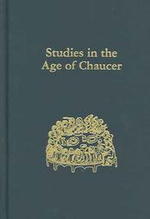
I try not to gloat but sometimes a little piece of luck comes my way and I find a bargain that is just too joyous to be quiet about. The other day I went into the Mind bookshop on Walton Street and found Vols. 1-22 of Studies in the Age of Chaucer, a find that I really never thought would happen. I got it for a super price too. I don't know how many articles I have photocopied over the years from this journal, or which I have promised to go back to read again in the library, and now I can (not) read them on my very own shelf. I am also a member of the New Chaucer Society and so have the newer numbers of SAC, so do not have many to make up the complete set (23-25, if anyone's offering!). Sheer joy.
I also picked up a copy, in Jericho Books, of Rewriting Chaucer: Culture, Authority, and the Idea of the Authentic Text, 1400-1602, ed. by Thomas A. Prendergast and Barbara Kline (Columbus, OH: Ohio State University Press, 1999), also for a bit of a bargain (£4.50!). There are quite a number of interesting articles in this collection, dealing with the very important issue of what the early scribes did to Chaucer, how that was dealt with by the earliest printers (who sometimes had access to manuscripts that are no longer extant, Caxton for example), and how they interacted. The freedom scribes felt, and the very different concepts of 'authenticity' that circulated in the period, all create hugely complex problems for modern editors and readers of Chaucer's work, problems that are unlikely to be solved any time soon. At least that is until someone finds a holograph copy of the complete works of Chaucer. What's the alternative, then? Read Chaucer from transcriptions of Hg, or El, or in parallel texts like the Chaucer Society publications done by Furnivall? Or on CD-ROM facsimiles with hypertext links to other readings? The Riverside Chaucer in this scenario would become obsolete and students would read from their computers and turn the leaves of digital manuscripts. But editing will still be required, presumably. So what kind? And, if the Variorum Chaucer really is so methodologically flawed as everyone says then will Kane's principles be expanded (exemplified in his Piers Plowman edition) and applied to Chaucer? And who will that be?
I also picked up a copy, in Jericho Books, of Rewriting Chaucer: Culture, Authority, and the Idea of the Authentic Text, 1400-1602, ed. by Thomas A. Prendergast and Barbara Kline (Columbus, OH: Ohio State University Press, 1999), also for a bit of a bargain (£4.50!). There are quite a number of interesting articles in this collection, dealing with the very important issue of what the early scribes did to Chaucer, how that was dealt with by the earliest printers (who sometimes had access to manuscripts that are no longer extant, Caxton for example), and how they interacted. The freedom scribes felt, and the very different concepts of 'authenticity' that circulated in the period, all create hugely complex problems for modern editors and readers of Chaucer's work, problems that are unlikely to be solved any time soon. At least that is until someone finds a holograph copy of the complete works of Chaucer. What's the alternative, then? Read Chaucer from transcriptions of Hg, or El, or in parallel texts like the Chaucer Society publications done by Furnivall? Or on CD-ROM facsimiles with hypertext links to other readings? The Riverside Chaucer in this scenario would become obsolete and students would read from their computers and turn the leaves of digital manuscripts. But editing will still be required, presumably. So what kind? And, if the Variorum Chaucer really is so methodologically flawed as everyone says then will Kane's principles be expanded (exemplified in his Piers Plowman edition) and applied to Chaucer? And who will that be?
3 comments:
Well, all that "who will that be?" stuff wasn't meant to have an implicit finger pointed at myself. Chaucer editing is a nest of vipers, and the truth is that at so many points two readings are as valid as each other and there is just no way to be sure about which one is authentic, or should I say "authentic". So then it's down to five or ten years of footnotes griping at each other about variant readings and faulty editing. It's thicked-skinned work to be honest. And certainly not for a neophyte like me!
Maybe you could engage a medium and get old Geoffrey to dictate his works anew?
Yes, I can think of a couple of Chaucer editors not a million miles away who would love writing a review of that!
Post a Comment